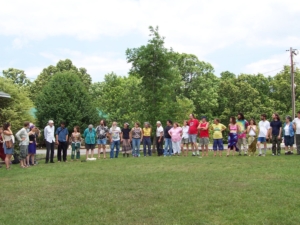Yesterday, the Supreme Court cleared the way for Mountain Valley Pipeline to begin construction on the more than 500 rivers and streams in its path.
This is a precedent-setting case, and the uncertainty leading up to the SCOTUS decision has caused a roller-coaster of emotions. This summer, we have felt despair when our lawmakers trampled over our rights to due process, anxiety as heavy equipment started closing in on our riverbanks, and hope when the 4th Circuit Court put a stay on construction pending judicial review.
These two community sessions will offer practical teachings and exercises for metabolizing the personal, political, and community impacts from environmental harms. It is common and understandable for frontline communities to experience feelings of exhaustion and burnout from this work, and in these two 2-hour sessions, Lydia from the School of the Great Turning will offer practices from her 15 years of experience supporting frontline communities fighting to protect their most beloved landscapes, through both wins and losses. Using the foundation of the “Work That Reconnects,” participants will learn resources for metabolizing some of their experiences in this work and deepen in connection with each other.
The “Work That Reconnects” (WTR) is a framework and set of practices developed by Joanna Macy, a scholar, environmental activist, and Buddhist practitioner. It is a holistic approach to personal and collective transformation that aims to address the ecological and social challenges facing humanity in these times. Lydia has trained steadily with Macy and will offer teachings and practices at each stage of this spiral that can support reflection and ongoing repair






